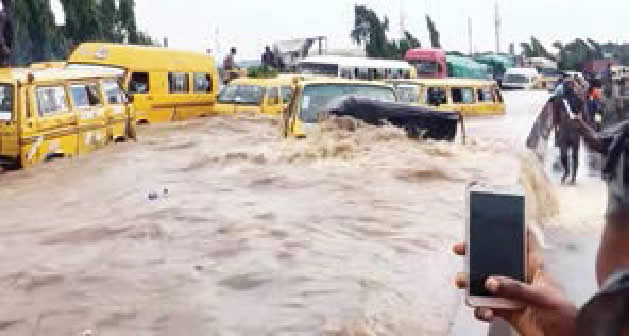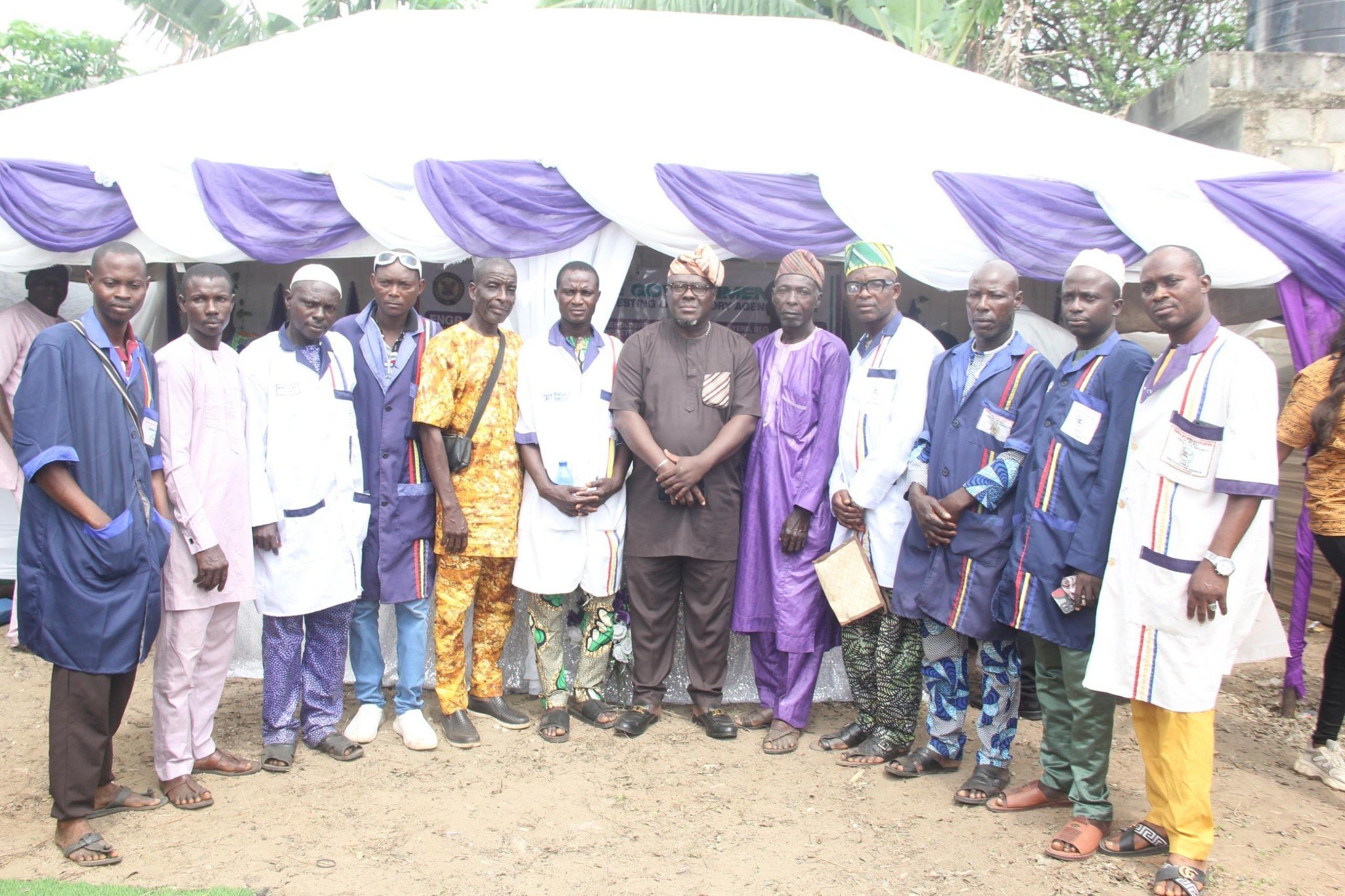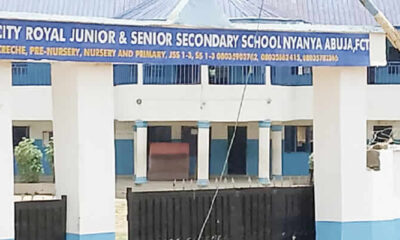News
Nationwide alert: FG warns of five-day flooding in 19 states
Published
2 months agoon

The Federal Government has forecasted heavy rainfall over a five-day period that may trigger flooding across 19 states and 76 locations.
The warning, issued on Tuesday by the National Flood Early Warning Systems Centre of the Federal Ministry of Environment, called on stakeholders and residents to take urgent precautionary measures.
This comes as devastating floods struck Ogun and Gombe states on Tuesday, with other states — including Lagos, Plateau, Anambra, and Delta — also affected by the disaster.
According to the centre’s flood prediction obtained by our correspondent, the affected areas are expected to experience rainfall likely to cause flooding from August 5 to August 9, 2025.
The predicted states and locations are Akwa-Ibom (Edor, Eket, Ikom, Oron, Upenekang); Bauchi (Tafawa-Balewa, Azare, Jama’are, Kari, Misau, Jama’a); Ebonyi (Abakaliki, Echara, Ezilo); Cross-River (Ogoja Edor, Obubra); Nasarawa (Keana, Keffi, Wamba); Benue (Agaku, Buruku, Gboko, Igumale, Ito, Katsina-Ala, Ugba, Vande-Ikya); Kaduna (Jaji, Kafancha, Birnin-Gwari, Zaria) and Katsina (Bindawa, Bakori, Daura, Funtua).
Others are Kebbi (Bagudo, Birnin-Kebbi, Bunza, Gwandu, Jega, Kalgo, Kamba, Kangiwa, Shanga, Ribah, Sakaba, Saminaka, Yelwa, Gauri-Banza); Kano (Bebeji, Gezawa, Gwarzo, Kano, Karaye, Tundun-wada, Wudil, Kunchi); Niger (Kontagora, Rijau, Ringim); Plateau (Mangu); Taraba (Donga, Takum); Jigawa (Diginsa, Gumel, Dutse, Gwaram, Hadejia, Miga); Yobe (Machina, Potiskum); Zamfara (Anka); Sokoto (Sokoto, Wamakko); Borno (Biu); and Gombe (Bajoga).
Flooding in Nigeria has become a yearly occurrence that claims lives and destroys many properties. Last year, 31 states were reportedly affected by flooding, causing hundreds of deaths, injuring thousands of others and affecting 1.2 million.
On September 10, 2024 the Alau Dam collapsed, causing floods in Borno State, killing at least 150 people, displacing 419,000 others and causing the community to submerge 70 per cent.
The country has experienced a series of flooding events that caused property damage, fatalities, injuries and displacement this year. The deadliest flood so far this year was in May that reportedly killed at least 200 people with thousands displaced in Mokwa, Niger State.
The floods, triggered by intense rainfall and exacerbated by a dam collapse, caused widespread destruction and severely impacted the community’s access to essential services.
While Mokwa was the most severely affected area, other parts of Nigeria also experienced flooding in 2025. The flooding affected multiple states, including Rivers State – where torrential rains caused floods and landslides that buried homes and swept people away in the city of Okrika, killing at least 25 people – and put millions of people at risk.
In April, at least 13 people were killed in Kwara State and Mokwa, including three people on a canoe that capsized on a flooded river, and rice fields were destroyed after flooding triggered by the routine water release from the Jebba Hydroelectric Power Station dam affected 30 communities.
Recently, the National Economic Council approved the release of intervention funds to support nationwide flood mitigation and response efforts.
NEC approved the disbursements of N3bn each to the 36 states and the Federal Capital Territory; N1.5bn to the Federal Ministry of Budget and National Planning; N1.5bn to the Federal Ministry of Environment; N1.5bn to the Federal Ministry of Water Resources and Sanitation; and N10bn to the National Emergency Management Agency.
In a dashboard released last Friday by NEMA, it showed that no fewer than 165 persons have died, 82 missing and 119,791 persons have been affected by this year’s flooding.
The agency also stated that 138 persons sustained various degrees of injuries, 43,936 displaced, 8,594 houses affected and 8,278 farmlands destroyed across 43 Local Government Areas in 19 States.
According to the agency, children and women were mostly affected.
191 dead – NEMA
Meanwhile, a new report from the National Emergency Management Agency has revealed that in 2025, no fewer than 191 lives have been lost to the floods that have ravaged parts of the country, while 94 people remain missing.
The report obtained by our correspondent on Tuesday showed that Niger State recorded the highest number of fatalities, with 163 deaths, followed by Adamawa State, where 26 people lost their lives. One death each was reported in Borno and Gombe states.
The data further indicated that, so far this year, the floods have affected 134,435 people across 20 states and 47 local government areas.
The affected states include Abia, the Federal Capital Territory (Abuja), Adamawa, Akwa Ibom, Anambra, Bayelsa, Borno, Delta, Edo, Gombe, Imo, Jigawa, and Kaduna. Others are Kano, Kogi, Kwara, Niger, Ondo, Rivers, and Sokoto.
Additionally, 48,056 people have been displaced, while 239 injuries have been reported. The floods have also damaged 9,499 houses and affected 9,450 farmlands.
NEMA’s dashboard also revealed that among those affected are 27,121 men, 41,539 women, 60,071 children, 5,704 elderly persons, and 1,874 persons with disabilities.
In 2024, the floods affected 5,264,097 individuals, displacing 1,243,638 people across 35 states and 401 local government areas. The disaster resulted in 1,237 deaths and left 16,469 individuals injured.
Also, 116,172 houses were destroyed, and 1,439,296 hectares of farmlands were affected, further worsening the economic and humanitarian impact of the flooding across the country.
Ogun, Gombe ravaged
Parts of Ogun and Gombe states were ravaged by floods on Tuesday following heavy rainfall that began Monday night and lasted into the early hours of Tuesday.
At Redemption City, along the Lagos-Ibadan Expressway in Mowe, Ogun State, The PUNCH observed that residents, schoolchildren, and visiting church members attending the Redeemed Christian Church of God annual convention were trapped for hours as floodwaters submerged parts of the area.
One of the worst-hit areas was Estate 15, where some vehicles were completely submerged. Stranded residents had to abandon their cars and resorted to using canoes as a temporary means of transportation.
In response, RCCG officials deployed Type D school buses to help ferry people in and out of the premises.
“I was trapped inside the RCCG camp this (Tuesday) morning and couldn’t leave for work until a special luxurious bus provided by the church came to pick me and others,” a resident, Tunde, told The PUNCH.
It was same scenario at the OPIC area of the state, where the floods disrupted activities and destroyed properties.
In Gombe, the sExecutive Secretary, State Emergency Management Agency, Haruna Abdullahi, says no fewer than four persons died from flood, windstorms and rainfall.
He disclosed that about 278 households comprising individuals and farmlands were affected.
Abdullahi said, “The last incident was in Kwami, Dukku, Billiri, Gombe, Yalmatu-Deba, Akko Local Government Areas.
“We received report of four dead persons, two from Gombe Local Government Area, one from Dukku and another in Kwami LG. About 278 households were affected mostly windstorm and flooding of farmlands, and some houses. Mostly the deaths were caused by cracked walls.”
Other states
A night of relentless rainfall plunged parts of Lagos into crisis on Monday, as flash floods swept through residential and commercial areas, stranding thousands and crippling economic activity in Nigeria’s largest city.
The rain, which began late Sunday and intensified through the early hours of Monday, overwhelmed drainage systems and turned streets into rivers across both Lagos Mainland and Island.
By dawn, neighbourhoods such as Ijede in Ikorodu, Lekki, Surulere, Agege, Ajegunle, Alimosho, and Eti-Osa were inundated. Viral videos from Ijede showed families waist-deep in floodwater, wading through what were once roads. In one emotionally charged clip, a barefoot woman in Oko Ope cried out in Yoruba for government intervention, describing how her home had been overrun, “The water is everywhere. We can’t even go inside. We’ve lost everything.”
Traders at major markets were forced to abandon shops as floodwaters invaded stalls, damaging goods. Commuters were left stranded for hours, with major roads waterlogged and transport systems disrupted across the metropolis.
On social media, the hashtags #LagosFlood and #IjedeTragedy trended as residents posted photos of submerged vehicles, flooded living rooms, and schools under water, renewing calls for a long-term solution to Lagos’s perennial flooding crisis.
Despite repeated promises from state officials over the years, the combination of poor urban planning, blocked drainage systems, and unregulated construction in water-prone zones continues to leave Lagos vulnerable to seasonal flooding.
In Delta State, residents of Sapele and Oko communities began experiencing heavy flooding as of Monday. Some residents have already started relocating after parts of their communities were submerged.
Victims of the flood lamented the damage to property and disruption of their daily lives, appealing for immediate intervention from the government.
The Delta State Commissioner for Environment, Mr. Jamani Ejiro, visited Sapele for an on-the-spot assessment and expressed sympathy for the affected residents. He assured them of the state government’s readiness to respond promptly to alleviate their suffering.
In Oko community, located in Oshimili South LGA, residents described the annual flooding as a recurring menace and called for a lasting solution.
“We are tired of this yearly trauma. We need drainage systems, not just empty promises,” one resident said.
In a related development, the Delta State Government has established six fully-equipped IDP camps in anticipation of widespread flooding, Ejiro announced on Tuesday.
Speaking to journalists, Ejiro said the proactive measure was in response to the Nigerian Meteorological Agency’s prediction of heavy rainfall and possible flooding in several parts of the state.
According to him, the IDP camps — located in Kwale, Ozoro, Patani, Bomadi, Uto-Jeremi, and Asaba — have been strategically sited in high-risk flood-prone areas to provide timely shelter and support for affected residents.
“These camps are fully equipped with modern facilities, including sick bays, security units, kitchens, and other essential amenities to ensure the safety and comfort of displaced persons,” the commissioner stated.
Ejiro further disclosed that the state government has constituted a Flood Disaster Management Committee led by the Secretary to the State Government, Dr. Kingsley Emu. The committee, he said, is tasked with working closely with community leaders to sensitise residents in flood-prone communities on the need to relocate when necessary.
“Our goal is to ensure that lives are not lost due to preventable causes. When the need arises, we will evacuate affected residents to these designated camps,” Ejiro assured.
The announcement comes as several communities across Nigeria, including in Delta State, continue to suffer the devastating impact of seasonal flooding.
In Diggi town, Bunza Local Government Area of Kebbi State, a three-hour downpour displaced dozens of residents and left several homes underwater.
Eyewitnesses say the flood surged in from nearby unregulated waterways. “It came like a monster,” a resident said. “People lost everything within minutes.”
The Kebbi State Government directed its emergency agency and local authorities to provide immediate relief. Items including food, bedding, and medical supplies are already being mobilised, according to Ahmed Idris, Chief Press Secretary to the Governor.
Community leaders have urged citizens to keep drainages and waterways clear and are calling on NGOs, wealthy individuals, and corporate bodies to assist in recovery efforts.
In Bauchi State, the Bagel community in Dass Local Government Area suffered severe flooding, leaving many residents homeless. At least 13 houses were destroyed by the flood.
The Special Assistant on Media to the Chairman of Dass LGA, Yusuf Makama, confirmed the incident. He noted that Chairman Mohammad Jibo had visited the community, assessed the extent of the damage, and promised to provide relief materials.
“He appealed to the state and federal governments, as well as NGOs, to come to the aid of the victims,” Makama said.
In Shimankar District, Shendam LGA of Plateau State, a violent rainstorm on Sunday left a trail of destruction, affecting at least 50 homes, two primary schools, and a worship centre in Menkaat community.
Affected residents who spoke to The PUNCH in Jos on Tuesday described the extent of the destruction as “overwhelming.”
“We’ve been hit seriously. Our homes, schools, and places of worship were all destroyed,” said Lawrence Longwalk, a local resident. Another victim, Mrs. Akwe Hannatu, added, “We lost everything. Our home was destroyed, and we have nowhere to go.”
Though the State Emergency Management Agency has reportedly been alerted and plans to visit the area, residents say they are yet to receive tangible relief.
In Imo State, the National Emergency Management Agency confirmed that 27 villages in Oguta Local Government Area had been submerged by floodwaters. Seven villages in Ohaji/Egbema LGA, including Olokwu, were also affected, along with flash floods reported in parts of Owerri West LGA, such as Oforola, Avu, New Owerri, and the Akachi area.
A farmer, Amanze Okoro, told The PUNCH that he and his family had to relocate temporarily to their in-laws’ home in Owerri. “We had no choice. Our farm and house were completely taken over by water,” he said.
In Rivers State, continuous rainfall has led to flash flooding in parts of Port Harcourt and Obio/Akpor LGAs. Areas affected include Amaechi Drive in GRA, Odili Road, and the Obi Wali axis of Rumuigbo.
Environmental rights activist and Executive Director of Youths and Environmental Advocacy Centre, Dr. Fyneface Dumnamene, urged the government to declare a state of emergency in the flood-prone areas.
“Flash floods are now a regular occurrence. What we need is emergency drainage clearing, community sensitisation, and immediate government action. We can’t stop the rain, but we can prevent the suffering,” Dumnamene told The PUNCH in a phone interview.
With more rain predicted in the coming weeks by the Nigerian Meteorological Agency, residents across the country are bracing for further hardship. Environmental experts warn that without proactive infrastructure investment, emergency preparedness, and community education, Nigeria will continue to suffer the devastating consequences of seasonal flooding.
States prepare
In Katsina State, following NiMet’s prediction of possible floods in Daura, Jibia, Funtua, and Bakori LGAs, the state government has designated primary and secondary schools as temporary shelters.
Binta Hussaini Dangane, Executive Secretary of the State Emergency Management Agency, said local emergency committees have been trained across the 34 LGAs to respond promptly to any flood emergencies.
“The government has procured food and non-food items, while awareness campaigns are ongoing,” she said, urging residents to avoid dumping refuse in waterways and to clear blocked drainages.
Despite heavy and sustained rainfall in Bayelsa State, flood control efforts — especially in Yenagoa — have so far prevented severe flooding.
Officials credit ongoing desilting of natural drainage channels and reconstruction projects like the culvert at Osiri Road in Ekeki. Head of the Bayelsa Flood and Erosion Control Directorate, Chief Walson Omusu, said the state remains “ready and proactive.”
The Sokoto State Emergency Management Agency and the National Emergency Management Agency have commenced a joint flood damage assessment across multiple communities in the state following days of torrential rainfall that caused widespread destruction.
Assessment teams visited the most affected local government areas — Yabo, Shagari, and Tureta — where hundreds of residents have been displaced, homes washed away, and farmlands submerged.
In Yabo LG, floodwaters ravaged entire communities such as Shiyar Hegin-Rafi, Shiyar Sarkin Fawa, Shiyar Ubandoma, Shiyar Ubandawaki (Garkar Audu), and Kofar-Bai. Six rooms belonging to one Muhammadu Dan Nanuwa were completely destroyed, while 89-year-old Malam Bango Altine lost five rooms. The palace of the Sarkin Kabin Yabo also suffered significant damage.
In Shagari LG, more than 10 communities, including Lambara, Kambama, Jaredi, Kajiji, and Lokoko, were affected. Vast farmland in Illela-Chofal was submerged, raising fears of food insecurity. Local officials, led by disaster desk officer Ibrahim Abubakar, reported extensive destruction of crops and homes.
In Tureta LG, floods on July 23 and 25 displaced over 250 people across Inwala, Shiyar DanDile, and Lambar-Tureta. Two women were injured in a building collapse, while the home of a Federal Road Safety Corps official, Salisu Muhammad, was among those damaged. Tureta LGA Chairman, Hon. Aliyu Abubakar, blamed poor drainage systems for the disaster.
SEMA and NEMA say the data collected will guide relief distribution and long-term flood mitigation efforts. Temporary shelters have already been set up for displaced families, and officials pledged continued collaboration to strengthen infrastructure and drainage.
Despite flood warnings by NiMet and NIHSA, Kano State has not recorded any significant flooding as of early August. Authorities have, however, cautioned residents in flood-prone communities downstream of the Tiga, Challawa, and Bagauda dams to stay alert.
Similarly, the Nasarawa State Emergency Management Agency (NASEMA) confirmed that no part of the state has yet been flooded. Officials said they had launched sensitisation campaigns and prepared temporary shelters in Doma, Lafia, Toto, Awe, and Obi LGAs.
In Kaduna, there have been no reports of flooding despite consistent rainfall. The state emergency agency remains on alert as August and September typically see peak flooding. Authorities are monitoring dam levels and weather forecasts to ensure swift response.
The Benue State Emergency Management Agency also confirmed that no flooding has been reported. Officials are, however, prepared to respond if necessary.
While Edo State has yet to record major flooding this year, communities near the River Niger — including Udaba Odemokpa — remain on the edge as heavy rains are expected in September.
In Benin City, areas like Tomline along Lagos Road frequently flood after rainfall. Traders say blocked drainages continue to disrupt businesses.
FOLLOW US ON:
You may like
News
Trump administration cuts energy projects, freezes New York funding
Published
8 hours agoon
October 2, 2025
The Trump administration has announced plans to terminate dozens of clean energy projects and freeze billions of dollars for major projects in New York, intensifying a stand-off with Democrats over a US government shutdown.
US media outlets described the moves announced by the energy and transportation departments as part of the administration’s efforts to pressure Democrats in Congress to agree on a deal to end the shutdown.
US President Donald Trump had raced to enact hard-right policies even before the shutdown began after midnight on Tuesday, threatening mass firings and to slash government departments, and blaming Democrats for Congress’ failure to resolve a funding stand-off.
The Department of Energy announced on Thursday “the termination of 321 financial awards supporting 223 projects, resulting in a savings of approximately $7.56 billion for American taxpayers.”
It said in a statement that those projects — overseen by the Office of Clean Energy Demonstrations, the Office of Energy Efficiency and Renewable Energy and other bodies — “did not adequately advance the nation’s energy needs… and would not provide a positive return on investment of taxpayer dollars.”
However, recipients of federal funding have 30 days to appeal against a termination decision, and some have already begun the process, the statement said.
It did not list the projects in question.
In a post on social media platform X, Russell Vought, who heads the powerful Office of Management and Budget, called the slashed projects “Green New Scam funding” that was used to advance “the Left’s climate agenda”.
He listed the states affected by the decision. They include California, New York and 14 others — all blue states where Trump failed to win in the 2024 presidential elections.
California Governor Gavin Newsom said the Trump administration had decided to cancel “up to $1.2 billion” slated for a major hydrogen energy project, threatening tens of thousands of jobs.
“In Trump’s America, energy policy is set by the highest bidder, economics and common sense be damned,” Newsom said in a statement, vowing to keep pursuing a “clean energy strategy… no matter what DC tries to dictate.”
In New York — the home state of top Senate Democrat Chuck Schumer and House Minority Leader Hakeem Jeffries — the Department of Transportation announced on Wednesday it was freezing nearly $18 billion in federal funding for two major infrastructure projects, the Second Avenue subway and Hudson Tunnel.
The move takes aim at diversity, equity and inclusion policies, according to the department’s statement, saying that subsidizing projects with “race- and sex-based contracting requirements… is unconstitutional, counter to civil rights laws, and a waste of taxpayer resources.”
The funds would be frozen until a “quick administrative review is complete,” it said.
“Thanks to the Chuck Schumer and Hakeem Jeffries shutdown, however, USDOT’s review of New York’s unconstitutional practices will take more time,” it added, saying that the department “has been forced to furlough the civil rights staff responsible for conducting this review.”
New York Governor Kathy Hochul, a Democrat, said in a statement that halting funding for “critical infrastructure projects” was “political payback and an attack on New York.”
“Donald Trump has been clear: he is intent on using his reckless government shutdown to hurt the American people,” she said.
punch.ng
FOLLOW US ON:
News
Shettima returns to Abuja after attending UNGA, meetings in Germany
Published
8 hours agoon
October 2, 2025
Vice President Kashim Shettima has returned to Abuja after representing President Bola Tinubu at the 80th Session of the United Nations General Assembly in New York and high-level engagements in Germany.
The vice president’s aircraft touched down at the presidential wing of the Nnamdi Azikiwe International Airport, Abuja, in the early hours of Thursday, where he was received by senior government officials.
During the week-long engagements, Shettima delivered the President’s national statement at the UNGA, calling for comprehensive reforms of the global body.

He also advocated Africa’s sovereignty over its estimated $700 billion mineral resources and strengthened Nigeria’s partnerships with the United Kingdom, the Gates Foundation, and other international stakeholders.
In New York, Shettima met with UN Secretary-General António Guterres, who commended Nigeria’s bid for a permanent seat on the UN Security Council.
The vice president also showcased Nigeria’s $200 billion energy transition opportunities to global investors and assured members of the Nigerian diaspora of continued engagement in the Tinubu administration’s policies and programmes.
He later proceeded to Germany for further strategic meetings before returning to the country.
News
Lagos unveils artisan certification to curb building collapse
Published
9 hours agoon
October 2, 2025
The Lagos State Materials Testing Laboratory has launched a new certification and training programme for artisans in the construction industry as part of efforts to stem the spate of building collapses in the state.
The initiative, known as the Certified Structural Integrated Programme, was unveiled at a stakeholders’ forum held in Ese-Offin and Badagry, where block moulders, bricklayers, concrete mixers, steel fabricators and welders converged to pledge support for safer construction practices.
In a statement on Thursday by the Lagos Government, General Manager of LSMTL, Olayinka Abdul, said the programme marked a decisive step in tackling recurring tragedies linked to substandard construction materials.
“Without artisans, there is no construction. But with you, we have the power to ensure every construction is safe, sound, and secure. We need to earnestly curb episodes of collapse in high-water-prone communities, and we do not want such in your community. It ends today,” he said.
According to the statement, the CSIP is a five-year assessment programme aimed at certifying construction materials as fit-for-purpose.
It will also produce an official directory of approved block moulders, concrete mixers and steel fabricators, to whom developers will be directed for supplies.
“This is not just about enforcement; it is about partnership and empowerment. Together, we can forge an unbreakable alliance that makes Lagos a model for building safety and integrity,” Abdul added.
Technical experts at the forum highlighted the scientific backing for the initiative. Director of the Soil and Geotechnics Unit, Engr. Abimbola Adebayo, stressed the need for mandatory soil tests before construction.
Similarly, Kayode Akinfeleye of the Technical Services Department advised builders to ensure architectural drawings are obtained and preserved, describing them as “a core requirement in the Lagos building process.”
Artisan guild leaders welcomed the initiative. Chairman of the National Association of Block Moulders of Nigeria, Alhaji Fabiyi Oyeleke, described frequent collapses as “disheartening” and commended the forum as a step in the right direction.
On his part, Chairman of the Lagos State Bricklayers Association, Mr. Fashina Aro, noted the peculiarities of Lagos’s swampy terrain and urged all stakeholders to ensure materials and soil tests are completed before bricklayers commence work on any site.
Building collapse has been a persistent challenge in Lagos, with many lives lost and substantial property damage over the years.
In recent incidents, emergency responders have had to rescue workers from collapsed structures.
PUNCH Online reports that rescue teams pulled eight workers from the debris of a collapsed building in September.
Reports by the Building Collapse Prevention Guild show Lagos accounts for about 55% of recorded building collapse incidents in Nigeria over the past several decades.
In response, Lagos has taken steps to strengthen bodies like the Lagos State Building Control Agency, enhancing enforcement, monitoring, and regulation of building standards.
punch.ng
FOLLOW US ON:

Trump administration cuts energy projects, freezes New York funding

Shettima returns to Abuja after attending UNGA, meetings in Germany

Lagos unveils artisan certification to curb building collapse

‘Sleeping Prince’ of Saudi Arabia dies after 20 years in coma

How A Class Of 24 Students Produced 2 Presidents, 4 Governors, 2 Ministers, 4 Emirs, 3 Justices, 4 Ambassadors and Other Influential Leaders

Why Do You Continue To Lie Against Your Motherland? Presidency Calls Out Kemi Badenoch
Trending
-

 Business10 hours ago
Business10 hours agoNigeria’s eight-month debt service bill hits $2.86bn – CBN
-

 Lifestyle10 hours ago
Lifestyle10 hours agoAdekunle Gold embraces Nigerian roots with new album ‘Fuji’
-

 News10 hours ago
News10 hours agoNigerians languish in prisons as Ethiopia stalls repatriation MoU
-

 Business10 hours ago
Business10 hours agoNNPC laments losses as PENGASSAN halts strike
-

 News10 hours ago
News10 hours agoFubara sacks commissioners, others
-

 Crime9 hours ago
Crime9 hours agoSoldiers foil terrorists attack in Taraba, kill two suspects
-

 Business9 hours ago
Business9 hours agoInside Abuja, ‘business centres’ disguised as schools
-

 Sports9 hours ago
Sports9 hours agoMan United finalise deal for teenage Colombian midfielder Orozco





